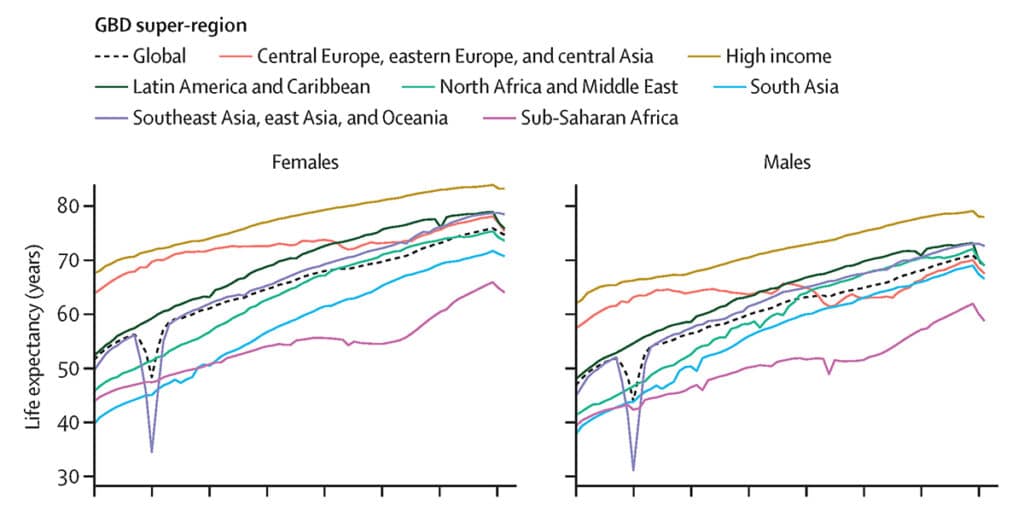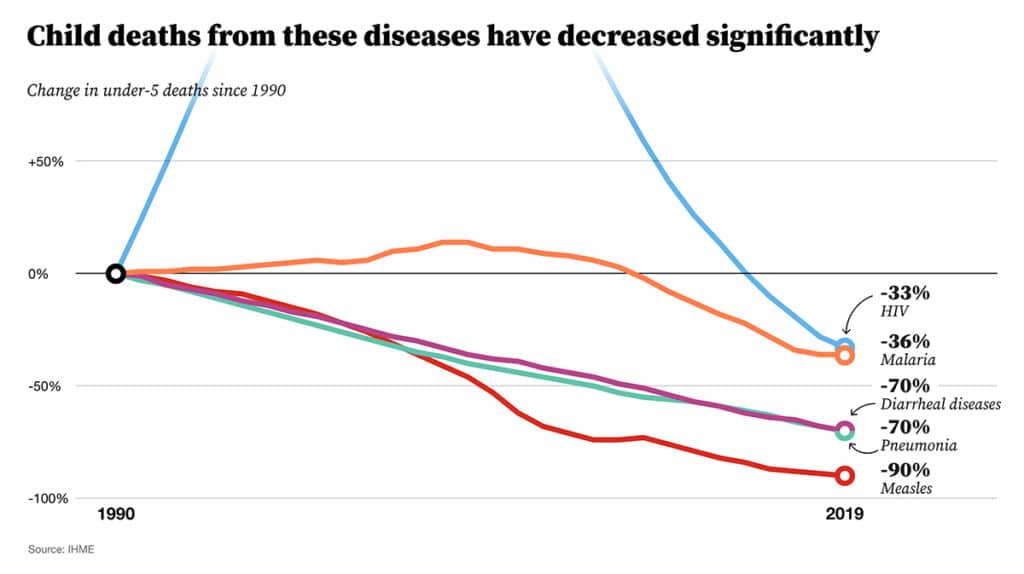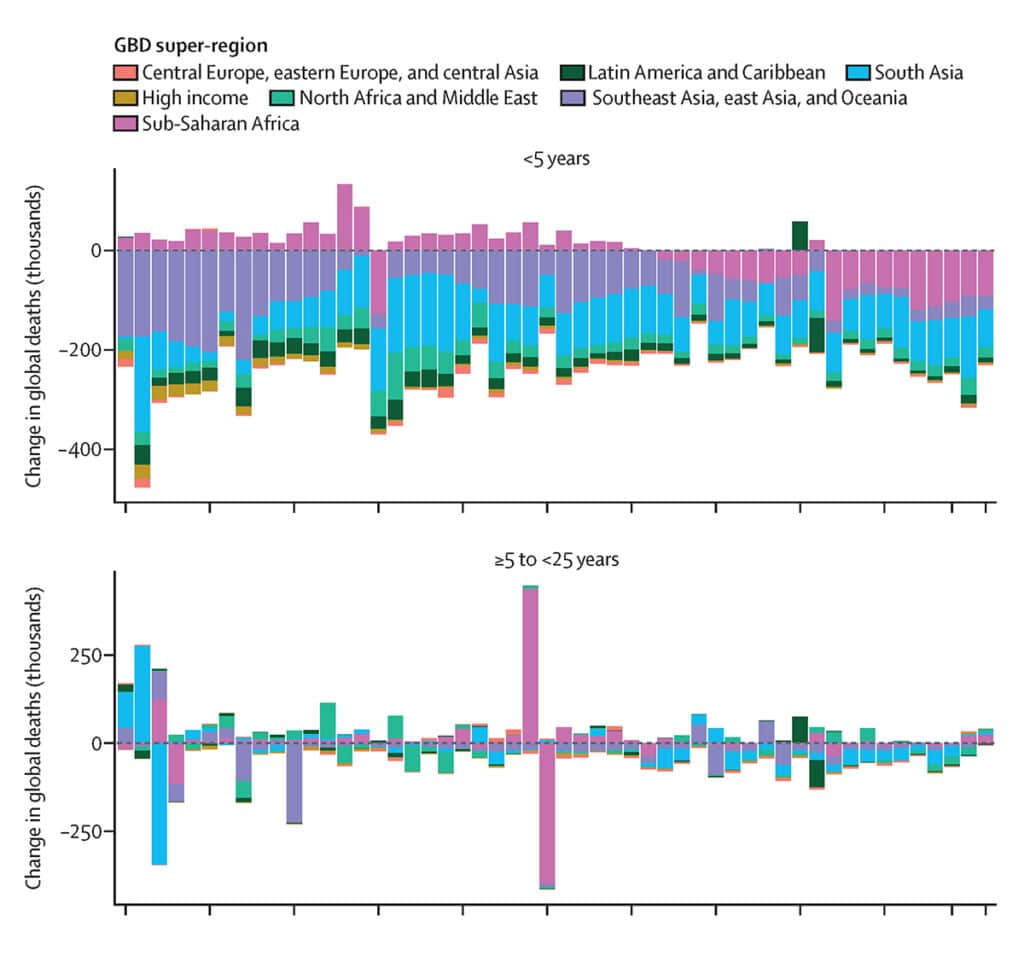Volcanoes are erupting in The Philippines, but on-fire Australia received some welcome rain. The Iran war cries have been called off and The Donald’s military powers are about to be hamstrung by the Senate. Meanwhile, his impeachment trial is starting, and we’re all on Twitter for a front-row seat.
What Could Go Right? One Uninterrupted Decline
The pandemic spared even the most vulnerable of the world’s young children.
This is our weekly newsletter, What Could Go Right? Sign up here to receive it in your inbox every Thursday at 5am ET. You can read past issues here.
One Uninterrupted Decline
How much did worldwide mortality drop between 1950 and 2019? Most of us won’t have a ready concept of the numbers. Was it 20 percent? Thirty-five? Fifty?
The answer, according to the latest edition of The Global Burden of Diseases, Injuries, and Risk Factors (GBD) study, is 62.8 percent, to be exact. The GBD study, which pulls data from 204 countries, is a regularly released series that takes a look at macro-level health trends; the latest release has a special focus on the impact of the Covid-19 pandemic.
The drop would have continued if not for the pandemic, which shaved about two years of life expectancy off in 2020–21. Better management would have limited the damage.
Still, the long-run numbers are impressive. Global life expectancy at birth went from 49 years in 1950 to 71.7 years in 2021, with notable increases in South Asia, North Africa, and the Middle East. The authors call this health progress “profound.”

The pandemic disrupted several longstanding progress trends, hampering economic development, increasing extreme poverty, and tamping down a variety of health outcomes—with one notable exception.
Eagle-eyed readers may have spotted in a March edition of this newsletter that in 2022, according to numbers from the United Nations, 4.9 million children died before the age of five. This figure is mind-bogglingly tragic, but it also represents a significant human achievement: it was the first time the number has ever dropped below five million.
It was the result of multi-front public health efforts to limit the most common killers of children, from pneumonia to malaria to diarrhea.

The new GBD study pegs the under-5 mortality figure a bit lower, at 4.66 million in 2021. The number is shocking, but consider that in 1950, with a global population three times smaller, it was 20 million.
Variations aside, what is remarkable is that under-5 child mortality, the study highlights, “remained largely unaffected by the pandemic” and continued to decline throughout it, although more slowly than in previous years.
This may seem like pale comfort, but I think it’s worth much more attention than it has gotten. As a virus, Covid-19 was substantially less of a threat to children than adults. But even a year ago, researchers weren’t sure how bad the indirect effects of the pandemic would be on child mortality, given, as this UNICEF post states, “strained health systems, household income loss, and disruptions to care-seeking and preventative interventions like vaccination.”
Poor countries suffered more greatly, with South Asia and sub-Saharan Africa accounting for over 80 percent of all deaths under five years old during 2020 and 2021. But even those areas saw overall declines for that age group, and limited changes for ages 5–25:

During the pandemic, at the height of partisan politics over lockdowns, masks, vaccines, and the rest, I remember reading an article that said it was a shame, in a way, that Covid wasn’t as dangerous to children. Perhaps if it were, we would take pandemic response more seriously in the United States.
I always thought that point was an excellent example of polarization distorting our common sense. There is no world where more children at risk or dead would have been better than what happened, as bad as it was. And while it can feel wrong to point out “silver linings” to the pandemic, that young children everywhere were largely spared, including the most vulnerable among them, is a grace.
As for the rest of the derailed progress trends, it’s a matter of how long the effects will linger. Some are stubborn: the World Bank is sounding the alarm that especially poor countries are not keeping pace with rich countries’ economic recovery. Others are almost artifacts of time—extreme poverty is a tenth of a percentage point higher than where it was prior to the pandemic—although that change represents millions of people.
Update: The coral news keeps coming. Coral Reef Watch has confirmed the fourth planet-wide mass bleaching event. One nonprofit is trying to keep disease at bay in the Caribbean; coral reefs in Cambodia and Southeast Asia are defying global trends and thriving; and scientists are deep-freezing corals in case reefs need to be repopulated in the future.
What Could Go Right? S6 E1

Can the idea of America looking beyond race work in such a divided time? Are there reasons we should still use race as a basis for public policy? Have colleges gone too far in their actions to confront racist actions in the past? Zachary Karabell and Emma Varvaloucas talk to Coleman Hughes, the author behind the new book The End of Race Politics: Arguments for a Colorblind America to look at a modern approach to race that seems to be making waves. | Listen now
By the Numbers
+90: The percent drop of oil spills from tankers since the 1970s. The quantity of oil spilled has also fallen, from over 300,000 tonnes in the 70s to an average of 10,000 tonnes per year in the past decade.
13.6: The proportion of adolescent girls in Ethiopia who supported the continuation of female genital mutilation—a traditional practice of removing all external female genitalia that can cause severe health effects—in 2016, down from 50 percent in 2000.
7 in 10: American Gen Zers say they are happy.
95: The age of 2023’s top-selling contemporary artist, Japanese trailblazer Yayoi Kusama (you may recognize her by her neon wigs or polka-dot dresses).
Quick Hits
⛴️ America’s first fully battery-powered tugboat has docked at the Port of San Diego and will start working in a few weeks, part of larger efforts to electrify ports in the US.
📉 American greenhouse gas emissions rose one percent between 2021 and 2022 but fell nearly 17 percent from 2005 levels, according to the Environmental Protection Agency’s (EPA) annual emissions inventory report. And, Australia’s are down 25 percent, but the government is eyeing a 65–75 percent cut by 2035 after a report suggested it was ambitious but doable.
🐨 Scientists are going all out to save Australia’s koalas, from chlamydia vaccines to koala-sniffing dogs who help find injured koalas after wildfires. Bonus: cute videos of koalas. (NYT $)
⚠️ Instagram is testing out a new feature for users under 18, in which images containing nudity and sent over direct message will be automatically blurred, along with a warning. Those on the receiving end can choose to view the image, or block the sender and report the chat. Once live, the feature will be on by default for all users under 18.
🚴 In the last five years, Paris has undergone a popular transformation to prioritize cycling over car transport. Now, inside the city, the number of cyclists outstrips the number of motorists.
🦠 Institutions worldwide are trying to develop a test to detect pancreatic cancer early, like mammograms do for breast cancer or colonoscopies for colon cancer, by finding markers in blood. New research from a global partnership is showing promise, detecting 97 percent of stage I and II pancreatic cancers in hundreds of volunteers, but has not yet been published in a peer-reviewed journal.
🇹🇼 The low death count—13—of the 7.4 earthquake that hit Taiwan in early April is the result of massively improved preparedness and earthquake response systems. More than 2,400 people died in the last earthquake of that magnitude in 1999; after that, the nation redid building and infrastructure regulations and implemented an effective early warning system for the public.
🇯🇵 Japan has put new reforms into place that advocacy groups hope will result in more children being placed into foster homes, rather than being raised in childcare institutions.
⚖️ New rules for background checks required for gun purchases will soon take effect federally in the US. They will close two loopholes: The first allows unlicensed dealers to sell guns at gun shows and over the Internet without background checks. The second allows sellers who have gone out of business or had their license revoked to convert their wares into a “personal collection,” again allowing for sales without background checks.
🚰 The Biden Administration has finalized new rules for toxic “forever chemicals” in drinking water, requiring utilities to reduce them to the lowest level that can still be measured.
🇱🇷 Liberia’s Senate, two decades after the second of two brutal civil wars that routinely utilized child soldiers and resulted in rape, mutilation, and mass death, has voted to establish a war crimes court.
👀 What we’re watching: Germany is considering legalizing abortion within 12 weeks. Poland is moving forward with draft legislation to lift the current near-total abortion ban.
💡 Editor’s pick: Why not convert vacant strip malls into housing?
TPN Member Originals
(Who are our Members? Get to know them.)
- Smartphones in schools are bad | Slow Boring | Matthew Yglesias
- Yes, social media really is a cause of the epidemic of teenage mental illness | After Babel | Jonathan Haidt
- Trump announces abortion position | Tangle | Isaac Saul
- The AI Revolution: Still no reason to fear a ‘jobpocalypse’ | Faster, Please! | James Pethokoukis
- Israel: Cease-fire, get hostages, leave Gaza, rethink everything | NYT ($) | Thomas L. Friedman
- No, Big Pharma’s high prices don’t drive innovation | WaPo ($) | Avik Roy
- The relentless cost of chronic diseases | Time | Alissa Quart
- Jung’s five pillars of a good life | The Atlantic ($) | Arthur C. Brooks


